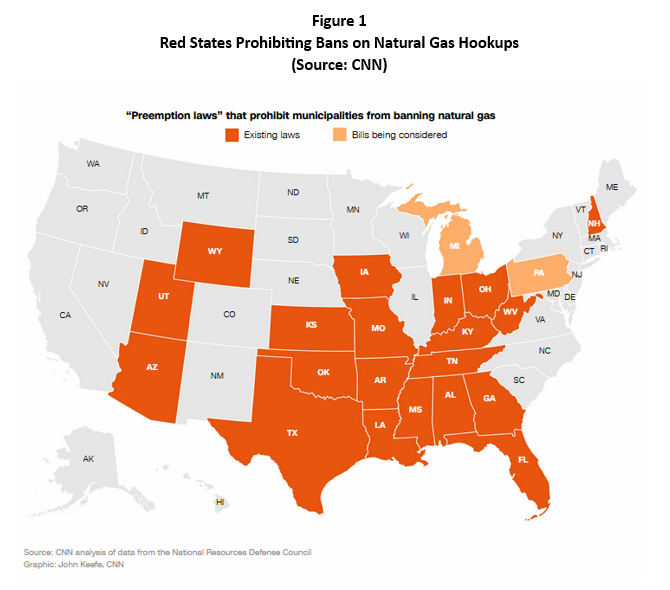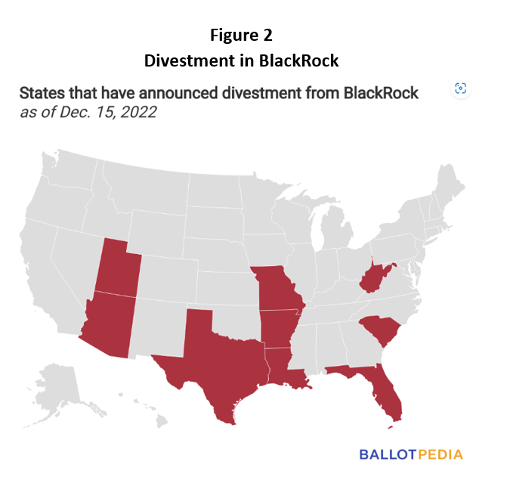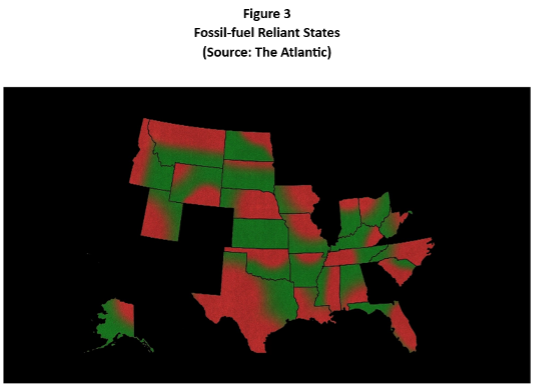· 10 min read
Today's culture wars seem to spare nothing and no one. So, it is hardly shocking that some red state legislatures and blue city councils have been locked into battles over natural gas hookups. Blue city councils, e.g., Austin, Texas, have taken to prohibiting the use of natural gas in new construction for stoves and other appliances. In these cases, the cities want to replace gas with electricity from clean sources like solar and wind.
In response, GOP-controlled legislatures in some states, e.g., Texas and Ohio, have enacted laws preempting the actions of the municipalities. The New York Times and CNN have reported that twenty GOP-controlled legislatures have enacted such legislation (see Figure 1).

Not nearly as prominent in the press as the conflicts between Republicans and Democrats over abortion and gun control, state/municipal struggles over climate-related policies are closely related and may be building in the run-up to the 2024 elections. According to Ronald Brownstein,
The states that are most deeply integrated into the existing fossil-fuel economy, either as producers or as consumers, tend also to be the places that are most resistant to, and separated from, the major demographic, cultural, and economic changes remaking 21st-century American life.
Some—not all—red state legislatures, attorneys general, and governors appear hell-bent on preventing the nation's transition to a low carbon economy. They are employing various measures to accomplish their objectives, including lawsuits and the passage of legislation intended to limit the deployment of clean energy alternatives like wind and solar. In addition to legislation preventing cities from prohibiting new natural gas hookups, are actions prohibiting state retirement plans from investing according to ESG principles.
What is ESG?
The acronym ESG stands for environmental, social, and corporate governance. The force behind socially responsible investments is the willingness of investors to put their money where their beliefs are.
ESG investing has gained popularity in recent years due to increasing awareness of the importance of sustainability and the impact of business practices on the environment and society. Some investors believe that companies with strong ESG practices may be better equipped to adapt to changing market conditions and may have long-term advantages over companies that do not prioritize ESG issues. The attack on ESG investing is a surrogate indicator for opposition to the transition to solar, wind, batteries, and other clean energy alternatives.
Leading the assault on ESG investing are more than a dozen Republican state attorneys general. According to Bloomberg Law (paywall), the primary concern of the AGs and others is "that environmental, social, and governance investing is part of a broader Democratic effort to prioritize climate change and other societal issues to the detriment of the fossil-fuel industry."
The issue at hand
The political assault by the right is backed by some of the party's biggest names, including former Vice President Mike Pence and the governors of Florida and Texas, Ron DeSantis and Greg Abbott. Their efforts are intended to ensure a place in the sun for fossil fuels.
“Stakeholder capitalism is not about politics. It is not a social or ideological agenda … It is capitalism, driven by mutually beneficial relationships between you and the employee, customers, suppliers, and communities your company relies on to prosper.”
Nine states have announced divestment from BlackRock (Figure 2). The investment firm manages just under $8 trillion in assets and believes consideration of ESG factors mirrors the diversity of its client base and reflects the reality that corporations will be facing in the future because of climate change. Arizona Treasurer Kimberly Yee (R) has accused BlackRock of moving “from a traditional asset manager to a political action committee.”

Miranda Willson and Jason Plautz point to Texas as the model of things to come—not just in the Lone Star State. They conclude that Texas's proposed preemption statutes "exemplify recent efforts in Republican-controlled states to boost fossil fuels at the expense of renewables amid rapid changes to the energy resource mix."
The actions by the Texas legislature are causing clean energy developers to have second thoughts. Judd Messer, the Vice President for the Advanced Power Alliance, phrases the concerns this way:
"We've got billions of investment dollars that we're hoping to bring to Texas, and that's at risk if the government is going to be punitive."
The spread of the contagion
Texas is hardly alone in attempting to thwart the development and deployment of clean energy technologies. In Ohio, the state legislature passed legislation that allows counties to ban large-scale solar and wind farms. Ten predominantly red counties have already exercised their newly granted power, to the chagrin of clean energy developers.
Fossil-fuel reliant states like Ohio and Texas are among the most aggressive in the effort to limit the use of citizen-led state ballot initiatives (Figure 3).

Energy and climate are hardly the only targets of the 23 GOP-controlled states like Texas, whose trifecta state governments, i.e., legislatures, governors, and attorneys general, are under Republican rule. The list of topics is long. It includes abortion, voting rights; zoning; education; healthcare; LGBTQIA+; police powers; election reforms; ballot initiatives; and censorship.
Clarence Anthony, CEO of the National League of Cities, believes we're seeing "an increase of home rule grab type legislation." According to Anthony—
"This year, there are 600 different preemptive laws that are being proposed by different legislatures throughout America. That, in fact, is a rise, and it's very concerning to our municipal leaders."
The grab is a consequence of the deepening quarter-century divide between political parties and governing philosophies. Nowhere is the entrenchment of far-right ideologies more apparent than in Texas and Florida. The disdain that Texas Governor Greg Abbott and State Attorney Ken Paxton have for renewables like solar and wind is well-documented. It appears to coincide perfectly with the current Texas legislature.
In terms of "rightness" and supporting actions, I would put Florida Governor Ron DeSantis atop the leaderboard–especially when it comes to vitriol and out-Trumping the big guy himself. Whether or not you agree with DeSantis, a recent Mason-Dixon voter survey showed that the soon-to-be presidential candidate has a nearly 60 percent approval rating.
The pandemic and inflation are partially responsible for another trend that may bode badly for red state-blue city relationships. CNN reported in August of 2021.
"Political and population trends are colliding as the steadily escalating tension between red states and their blue cities across the Sun Belt is reaching a breaking point over the volatile issue of school masking."
Although of differing intensities, any of the earlier items on the list of "targets" mentioned above, e.g., abortion, could be substituted for school masking.
In the CNN report, the words most deserving of emphasis are political and population trends are colliding. Although arguments may be made that the shift of populations now going on from coastal cities to America's middle-western and southern towns and hinterlands might liberalize red states, an equally compelling argument could be made that voters are self-selecting the kind of politics they support by moving to places like Florida and Texas.
Florida's transition to the most MAGA state in the union has happened over the last decade. According to the Hill, "the nation's largest and most volatile swing state, Florida has lurched to the right...becoming a mecca for the GOP's most influential luminaries and wealthiest donors."
It's been reported by L2, a data vendor, that fully 46 percent of the 394,000 new voters that moved into Florida during the pandemic registered as Republicans. In contrast, only 23 percent signed up as Democrats.
Texas, Arizona, and Nevada are becoming preferred destinations for Californians who feel the Golden State has become tarnished by ultra-left political policies and rising crime rates and homelessness. Is it enough to change the color of those states' politics? Maybe.
Threatening democracy
Something to watch for is any correlation between increasingly conservative state trifectas like Florida and Texas and the inflow of right-wing voters. Of course, the opposite could also be true in some situations.
Georgia has now elected two Democratic US senators to full terms. Were the results of Georgia's two recent runoffs dictated by the caliber of GOP candidates or an increasingly more moderate number of voters moving into Atlanta and elsewhere in the state?
According to The Atlanta Journal-Constitution, the number of registered voters in Georgia jumped 11 percent over 2018. Most new voters are under 35 and live in metro areas. With substantial increases in Hispanic and Asian voters, Georgia’s new residents are racially more diverse than the current population. Such demographics better reflect the politics of independents and Democrats—cohorts that favor policies to combat climate change.
In states like Georgia, where GOP politicians might feel threatened by the influx of moderates, another question arises. Will state conservatives feel the need to protect their agendas by speeding up the passage of preemptive legislation?
It's possible. The Peach State, after all, preempted cities and counties from banning new natural gas hookups. Efforts to grab back the power of social policies are not directed solely at climate-related issues.
The migration numbers coincide with the research of Fivethirtyeight.com. According to the group,
Americans have been moving south and west for decades. The pattern pops into view after the 2020 census when seven congressional districts moved to the receiving states; and it continues to be visible in the booming construction and job markets in cities across the Sun Belt.
Climate activists, therefore, need to be mindful of how conservative governments may look to limit proactive efforts at combating climate change and other progressive policies in their states.
Scott Dance writes in the Washington Post that "some red state governments are working to restrict or even ban citizen-led ballot initiatives, which have been used by progressive groups to bypass conservative lawmakers." There are a variety of direct and indirect ways to limit ballot initiatives.
In 2022, 109 bills altering the citizen-led ballot initiative process were proposed. Of the 109, 58 would have explicitly made the process more difficult. Arizona voters passed Proposition 132 in the November 2022 elections.
The proposition requires 60 percent of voters to approve a tax via a ballot measure—up from a simple majority. The vote was 50.7 percent in favor, with 49.3 percent opposed.
The Ohio legislature approved Senate Joint Resolution 2, a proposed amendment to the Ohio Constitution that would increase the threshold to pass constitutional amendments from 50 to 60 percent. Unlike Texas, the Ohio resolution applies to all proposed ballot initiatives.
The Ballot Initiative Strategy Center (BISC) reports that—
Attacks on direct democracy have been increasing since the 2016 election in response to progressive wins at the ballot box.
BISC reports a five-fold increase since 2017 in bills that threaten the ballot process. Anything that threatens the ballot process makes it harder to use citizen-based initiatives as a weapon in the effort to combat climate change.
In 2022, a variety of climate-related initiatives showed up on state and local ballots. According to the Nature Conservancy,
"voters in 14 states considered ballot measures secures public funding and forward-looking policies to protect people and nature in 2022. The measures varied. Most had to do with issuing bonds to buy and maintain parklands and clean drinking water, reduce air pollution, upgrade infrastructure, and reduce climate change impacts, including flooding and deadly heat. Seventeen measures passed, totaling more than $7 billion for conservation."
Under the best of circumstances, citizen-led ballot initiatives are complicated and expensive. How they fit into climate-related advocacy strategies is unclear. However, Jill Blanchard, director of Lawyers for Good Government's climate change program, believes
"The less people feel like they can rely on their legislators to make good decisions and pass good laws for them at the state level, the more likely you're going to turn to these types of ballot measures to try and make sure that money goes into these funds."
If Blanchard is right, then there's every reason to believe that the battles between red state (conservative) legislatures and blue (progressive) cities will increasingly find their way onto state and local ballots—changing the shape and complexity of future advocacy strategies.
This article is also published on the author's blog. illuminem Voices is a democratic space presenting the thoughts and opinions of leading Sustainability & Energy writers, their opinions do not necessarily represent those of illuminem.






